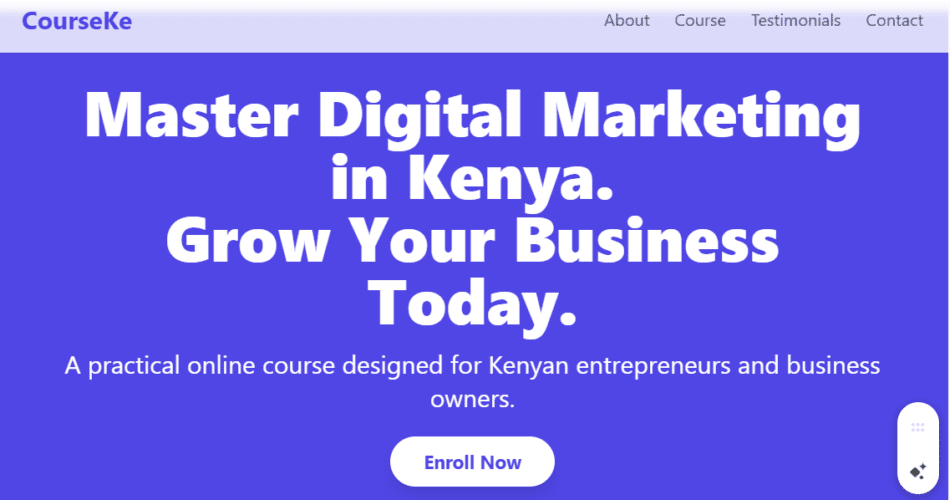SEO for Online Course Creators in Kenya
- Delivery Time2 Weeks
- English levelProfessional
- LocationUSA, United Kingdom, United Arab Emirates, New York, Nairobi, Kilimani, Kenya, Dubai, CBD Nairobi, Canada, Australia
Service Description
The cost of SEO for Online Course Creators in Kenya is 80000KES per month.Get SEO for Online Course Creators in Kenya at a price of 30000KES per month at Black Shepherd Technologies.
Unlock your potential with online courses designed for the Kenyan market. Learn in-demand skills from local experts, get certified, and grow your career. Start your journey today.
Search Engine Optimization (SEO) for online course creators in Kenya involves a strategic approach to increase the visibility of their courses and platforms in search engine results. This goes beyond just attracting traffic; it’s about connecting with the right audience—potential students actively searching for skills and knowledge. Key to a successful SEO strategy is understanding the unique Kenyan market and the specific challenges and opportunities within the region’s digital landscape.
This includes:
Keyword Research: Identifying the specific terms and phrases that Kenyans use when searching for online courses. This includes both broad topics (e.g., “digital marketing course Kenya”) and long-tail, conversational queries (e.g., “best online graphic design course in Nairobi for beginners”).
On-Page SEO: Optimizing course pages, blog posts, and other website content with relevant keywords, clear titles, and compelling descriptions. It also involves creating high-quality, valuable content that demonstrates expertise and provides genuine value to the user.
Technical SEO: Ensuring the website is fast, mobile-friendly, and easy for search engines to crawl and index. This is crucial for a good user experience and can significantly impact rankings.
Local SEO: If courses have a physical component or target a specific location within Kenya, optimizing for local searches can be a powerful way to reach a more targeted audience. This includes using geographic keywords and registering on platforms like Google Business Profile.
Content Marketing: Creating a blog, video series, or other content that supports the courses and answers potential students’ questions. This not only builds authority but also provides more opportunities to rank for a wider range of keywords.
Backlinks: Building a strong reputation by getting links from reputable Kenyan websites, educational institutions, and industry blogs. This signals to search engines that your courses are a trusted and valuable resource.
By implementing these strategies, Kenyan online course creators can increase their organic traffic, establish authority in their niche, and ultimately grow their student base.
SEO for online course creators in Kenya is a dynamic and evolving field that must adapt to the latest digital trends. The rise of AI and voice search, for example, presents new opportunities for content and keyword strategies. Voice search optimization, which focuses on long-tail, conversational queries, is becoming increasingly important as more Kenyans use smart devices. Similarly, the dominance of video content on platforms like TikTok, Instagram Reels, and YouTube means that course creators must integrate a strong video marketing strategy, not just for engagement but also for SEO. Creating short, engaging clips that drive traffic to a course landing page can be a powerful tactic.
Furthermore, a significant portion of the Kenyan population accesses the internet via mobile devices. This makes a mobile-first approach to SEO not just a best practice, but a necessity. Course websites must be responsive, load quickly on mobile networks, and provide a seamless user experience. Technical SEO also extends to implementing structured data (Schema Markup), which helps search engines understand the content of your courses, such as titles, descriptions, and pricing, leading to richer, more informative snippets in search results.
Beyond on-page and technical aspects, building authority through a robust link-building strategy is critical. This involves not just acquiring links from other reputable Kenyan websites and blogs, but also fostering partnerships with other educational institutions or industry organizations. Guest blogging on a respected platform within a relevant niche can provide valuable backlinks and increase brand visibility. Finally, understanding the unique challenges learners face in Kenya, such as internet connectivity issues in rural areas, can inform a creator’s strategy. By addressing these pain points in their content and marketing, they can build a more trustworthy and resonant brand.The landscape of SEO for online course creators in Kenya is being profoundly shaped by the rapid adoption of new technologies and user behaviors. A key trend is the growing influence of AI, which is moving SEO beyond simple keyword matching to a deeper understanding of user intent. Search engines are becoming “answer engines,” with features like Google’s AI Overviews providing direct, synthesized answers right at the top of the search results. For course creators, this means content must be structured to be easily digestible and authoritative enough to be featured in these snippets, even if it leads to a “zero-click” search. The focus shifts to building expertise, authoritativeness, and trustworthiness (E-A-T) to ensure content is selected by AI models as a reliable source.
Furthermore, the prevalence of Swahili as a language of search cannot be overstated. A successful strategy must include comprehensive keyword research in both English and Swahili to capture the full breadth of the market. Similarly, the local SEO landscape is not just about physical location but also about a deeper cultural resonance. Leveraging local partnerships, and content with culturally relevant references and examples, can significantly improve a brand’s authority and visibility within the Kenyan digital community.
Building a strong backlink profile also requires a localized approach. Instead of generic guest blogging, creators should seek out opportunities on reputable Kenyan blogs, news outlets, and educational websites. This includes collaborating with local micro-influencers and participating in industry events or webinars to get valuable, contextual links that signal to search engines that the courses are a credible resource within the Kenyan ecosystem.
In conclusion, a successful SEO strategy for online course creators in Kenya must be a comprehensive and agile effort that goes beyond the basics. It requires a deep understanding of the local market, including student needs and digital access challenges. By focusing on targeted keyword research in both English and Swahili, adopting a mobile-first design, creating engaging video content, and building a localized link-building strategy, course creators can effectively increase their organic presence. This approach not only helps them rank higher in search results but also establishes them as a trusted, authoritative source of knowledge, ultimately leading to sustainable business growth and a thriving learning community. Embracing these evolving trends, particularly the shift toward AI-driven search and conversational queries, is no longer optional but a necessity for long-term success in the Kenyan online learning space.








